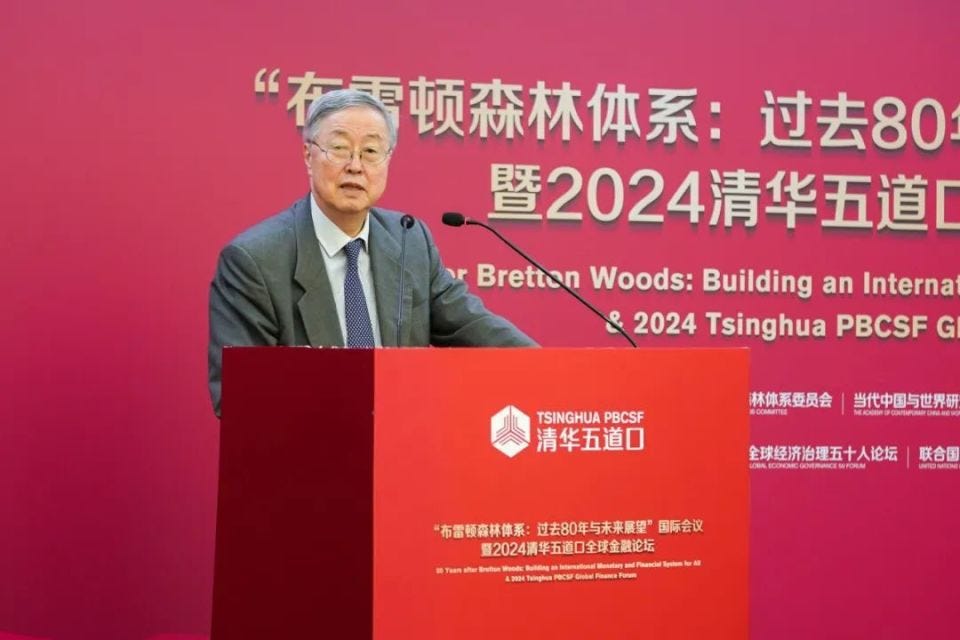Central bank advisor urges Beijing to put growth above debt worries
The U.S. economy is doing extraordinarily well against others since COVID-19, Huang Haizhou of Tsinghua University says.
On May 27-28, 2024, “80 Years after Bretton Woods: Building an International Monetary and Financial System for All” & 2024 Tsinghua PBCSF Global Finance Forum were successfully held in Hangzhou, Zhejiang Province, China.
PBCSF is short for People’s Bank of China School of Finance, the name of a School within Tsinghua University and a successor to the Graduate School of China’s central bank.
Between 2021 and 2023, I had the privilege of attending the Finance and Media Program of PBSCF, which annually gathers and trains journalists in China. Every year, the Tsinghua PBCSF Global Finance Forum gathers the best minds of China’s financial world, and this year’s speakers include
Zhou Xiaochuan, China’s former central bank governor
Zhu Min, former Deputy Governor of China’s central bank and former Deputy Managing Director of the International Monetary Fund (IMF)
Marc Uzan, Executive Director of the Reinventing Bretton Woods Committee (RBWC)
Xuan Changneng, Deputy Governor of China’s central bank
Liao Ming, Vice Minister of Finance
Many foreign speakers also speak at the forum. Some speeches made at the forum are emerging on the Chinese part of the Internet and they seem immensely interesting. I regret very much not having the time or resources to cover it earlier, but let’s start with a brief speech from Huang Haizhou, a professor at Tsinghua PBCSF. Huang was named to be on the monetary policy committee of China’s central bank in March - with Huang Yiping (no relation), another economist at Peking University.
Before teaching at Tsinghua PBCSF, he was a senior economist at the International Monetary Fund and Barclays before becoming a senior executive at the CICC.
I think Huang’s highlight of the extraordinary growth of the U.S. economy since COVID and the fact that all other major countries’ share of global GDP has declined against the U.S. is particularly interesting, especially against the much-touted “the East is rising and the West declining" in China. This message from Huang featured prominently when some Chinese social media posts reported his speech.
I think the biggest takeaway from Huang’s speech was that China shouldn’t shy away from taking more debt to spur growth. To be exact, he didn’t say Beijing should do that - but otherwise, why would he underline the message in a Chinese forum packed by largely Chinese economic and financial elites?
I sourced Huang’s speech from a WeChat blog self-identified as associated with Tsinghua PBCSF. I have no reason to doubt the authenticity of the association.
黄海洲:增长应该优先于对债务的担忧
Huang Haizhou: Growth should be prioritized over debt worries
I have three points to make.
First, the world is complex. It is quite difficult to describe an issue with just one simple sentence, but in some countries, economic growth is very slow. In the face of a series of challenges following the 2008 global financial crisis, I hope the future is not as bleak, and that growth will be the key.
Therefore, I will address three points: first, the importance of systems; second, the diversity of the world; and third, the reliance on growth for the future.
During the 1944 Bretton Woods negotiations, China made a very significant contribution. China had an excellent proposal put forward by Kung Hsiang-hsi (Dr. Chauncey Kung/H.H. Kung) and Soong Tse-vung (T.V. Soong). The proposal was straightforward: if there was no global financial crisis, debtors wanting to default posed a major issue, and thus creditors should be protected in such times. However, if the world faced a major crisis, like post-World War II reconstruction, the debt issue would be huge, and policies should lean towards protecting debtors. Unfortunately, this discussion was not mentioned by outsiders at the time, and regrettably, all related documents were taken to Taiwan and not made public. However, someone found this document later, which contains very important insights. I would like to take this opportunity to review this history with everyone.
After the establishment of the Bretton Woods system, global growth was very stable. In 1944 and 1945, it resolved pre-World War II disputes and a series of other issues. The system was still effective, and global growth was very good, with trade volumes increasing rapidly.
However, there was a significant flaw in the system, which was the linkage between the U.S. dollar and gold, while the global supply of gold was insufficient. It wasn't until the Plaza Accord in 1985 and the Louvre Accord in 1987 that a new system was found. From 1971 to 1981, the global economy experienced high inflation and low growth because the system was no longer functioning.
Reviewing the period from 1981 to the 2008 global financial crisis, it is generally believed that the global economy experienced high growth and low inflation. However, this was not the case for all countries. Japan actually lost a decade, then another decade, and then another 10 years. In these 30 years, Japan had zero growth, zero interest rates, and zero inflation. Meanwhile, the U.S. had moderate development overall, and China experienced rapid growth. The world is quite complex, but this global system remains very important.
In 2020, the world underwent some changes again, with countries adopting quite different measures in response to the COVID-19 pandemic. Today, we know that the GDP of almost every country in 2023 exceeded that of 2019, before the COVID-19 pandemic. However, if we compare growth rates, two important changes are worth noting.
The first important change is that although all countries' GDP in 2023 have exceeded those of 2019 and have generally recovered, if we divide the 2023 GDP of each country by the 2023 GDP of the United States and compare it to the ratio of their 2019 GDP to the 2019 GDP of the U.S., we find that every country has declined against the U.S. compared to 2019.
In the past three years, the only country that has significantly increased its contribution to the global GDP by 2-3 percentage points is the United States. Other countries' contributions to the global GDP have either remained flat or are smaller than the U.S.'s 3-point growth, or have declined. Among these, Japan's contribution has decreased the most, largely due to exchange rates.
The world is complex, and we cannot generalize the global economy as high debt, high inflation, and low growth. In the past two years, the nominal GDP growth of the United States has increased by nearly 20 percentage points. How is this low growth? The U.S. has created giants like the "Magnificent 7” with a market value of $2.3 trillion. This is certainly not low growth.
In fact, when global growth was good, Japan's growth performed very poorly, losing 30 years. Before the crisis broke out in the 1990s, Japan's per capita GDP reached 150% of that of the United States. Since 1945, among large countries with a population of over 50 million, Japan is the only country whose per capita GDP surpassed that of the United States, reaching 150% of it. After 30 years of zero growth, zero interest rates, and zero inflation, Japan's per capita GDP today is less than 50% of that of the United States. The complexity of the world is something we should pay close attention to.
The second important change. In 2012, Lawrence Summers gave a famous speech at the International Monetary Fund. What was he worried about? He was concerned that after the 2008 crisis, the world would enter an era of low growth, low interest rates, and low inflation. He mentioned that many countries faced zero or negative interest rates. In 2012, Europe experienced the Euro debt crisis, with significant issues in countries like Greece, Italy, and Spain, which attracted considerable attention. However, looking back today, the situation that Lawrence Summers worried about did not happen, at least not in the United States. Is the U.S. experiencing low interest rates, low inflation, and low growth? No. Therefore, the world changed quickly. In this sense, the U.S. successfully utilized the crisis to transform a potential long-term issue of low inflation, low growth, and low interest rates, akin to Japan's situation, into relatively high growth, relatively high inflation, and relatively high interest rates.
The U.S. has experienced relatively high inflation in the past two years and is still facing a relatively high level now. I believe this inflation level will come down. Therefore, I think we should not be overly concerned about the U.S. debt risk, as the actual interest rate in the U.S. has been negative over the past two years. If the nominal GDP growth of the U.S. can remain above 5%, then its economic growth will be sufficient to address the debt issue. In fact, as I mentioned earlier, the nominal GDP of the U.S. has increased by nearly 20% over the past two years. Additionally, we must pay attention to another matter. In 2020, the U.S. implemented an extremely strong stimulus (fiscal stimulus) – the U.S. national debt-to-GDP ratio increased by nearly 13% of GDP in one year, raising it by nearly 30 percentage points.
My third point is that the future relies on growth. Growth is key, driven by technological revolution, and many countries need to carry out institutional reforms. At the international level, we must continue to embrace globalization and support multilateralism. The IMF can still play a very important role in this regard. In this sense, the best solution to all problems is growth. Growth should take priority over debt concerns. This is my third point.
In summary, I have made three points: first, systems are very important. I hope that if we have the opportunity over the next 40 years, things can improve, possibly leading to a Bretton Woods 3.0; second, the world is diverse. It is hard to summarize world trends in one sentence, and it is difficult to describe all countries being in the same state at the same time or for a considerable period. Even when the whole world is doing well, some countries may not be; third, the key to the future lies in growth.
Thank you all!
Zhou Xiaochuan’s speech at the 2021 forum








